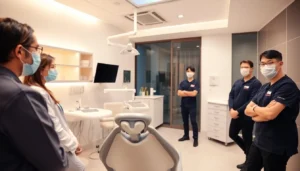Effective Rehabilitation Center in Kyiv Specializing in Addiction Recovery and Holistic Care

Understanding the Role of a Rehabilitation Center in Overcoming Dependency
What Is a Rehabilitation Center and Its Purpose
A rehabilitation center is a specialized healthcare facility dedicated to helping individuals overcome various dependencies, including substances like drugs and alcohol, as well as behavioral issues such as gambling. These centers serve as comprehensive environments where patients receive medical, psychological, and social support aimed at restoring their physical health, mental stability, and social functioning. The primary purpose of a rehabilitation center is to facilitate the recovery process, enabling individuals to break free from addiction’s destructive cycle and reintegrate into society as healthy, productive members.
Unlike acute medical hospitals that address immediate health concerns, rehabilitation centers focus on long-term recovery, emphasizing prevention of relapse, emotional resilience, and life skills development. They typically incorporate multidisciplinary teams—including doctors, psychologists, social workers, and addiction specialists—to tailor treatment plans to individual needs, thereby increasing the chances of sustained sobriety.
Types of Rehabilitative Services Offered
Rehabilitation centers provide a broad spectrum of services essential for comprehensive recovery. These services can be broadly categorized into:
- Medical Rehabilitation: Detoxification protocols, medication-assisted treatment (MAT), and management of withdrawal symptoms to ensure safe and effective detoxification.
- Psychological Therapy: Individual and group counseling sessions, cognitive-behavioral therapy (CBT), motivational interviewing, and family therapy to address underlying psychological issues.
- Holistic and Alternative Approaches: Art therapy, meditation, yoga, and physical activities aimed at promoting mental well-being and stress reduction.
- Social Rehabilitation: Life skills training, vocational rehabilitation, and community integration programs designed to prepare individuals for independent living post-treatment.
- Continued Support: Aftercare planning, relapse prevention programs, and long-term counseling to sustain sobriety beyond the immediate rehabilitation period.
These integrated services ensure a holistic approach that not only eliminates dependency but also enhances the overall quality of life, fostering resilience and self-reliance.
Why Choosing a Professional Rehabilitation Center Matters
The decision to seek help at a qualified rehabilitation center is critical for the success of overcoming addiction. Professional centers, such as the rehabilitation center in Kyiv, offer evidence-based treatment protocols delivered by experienced multidisciplinary teams. This expertise ensures that therapies are tailored to individual needs, considering the complexity of each case.
Professional centers also adhere to strict standards for safety, confidentiality, and ethical treatment, creating a secure environment where patients can fully engage in their recovery journey. Furthermore, they provide a structured program to minimize the risk of relapse, which is often higher when individuals attempt self-managed withdrawal or informal recovery methods.
Importantly, choosing a reputable center instills confidence in patients and their families, knowing that treatment is supported by medical research, continuous monitoring, and a network of aftercare services that significantly improve long-term outcomes.
Comprehensive Approach to Addiction Treatment in Kyiv
Assessment and Personalized Treatment Plans
Successful addiction treatment begins with a thorough assessment of the patient’s physical health, mental state, and social circumstances. At centers like «Троицкий», professionals conduct detailed interviews, medical examinations, and psychological evaluations to understand the severity of dependence, co-occurring mental health conditions, and environmental factors.
Based on these findings, a personalized treatment plan is developed, aligning therapeutic methods and resources with individual needs. This tailored approach increases engagement and effectiveness, ensuring that each patient receives the precise support necessary for their recovery.
Therapeutic Methods: Medical, Psychological, and Holistic
The treatment methodology in Kyiv’s reliable centers features a combination of proven medical protocols, psychological interventions, and holistic practices:
- Medical Interventions: Detox programs, pharmacotherapy (e.g., methadone or naltrexone for opioid dependence), and management of withdrawal symptoms.
- Psychological Support: Cognitive-behavioral therapy (CBT), motivational enhancement therapy, and individual counseling to address behavioral patterns and emotional triggers.
- Holistic Techniques: Mindfulness, yoga, nutrition counseling, and sports activities that promote mental health and foster lifestyle changes integral to sustained sobriety.
Integrating these methods provides a multifaceted recovery environment, addressing both physiological and psychological aspects of dependence.
Stages of Recovery: From Detoxification to Long-term Sobriety
The path to long-term sobriety in a professional rehabilitation center typically unfolds through several key stages:
- Detoxification: Safe management of withdrawal symptoms, often the first step, where medical supervision ensures patient safety.
- Intensive Treatment: Engagement in therapy sessions, educational programs, and skill-building activities aimed at understanding addiction and developing coping strategies.
- Reintegration and Rehabilitation: Focus on resocialization, employment support, family therapy, and community engagement to rebuild a healthy lifestyle.
- Aftercare and Long-term Support: Monitoring and ongoing counseling to prevent relapse, adapt to life stressors, and maintain sobriety.
Recognizing that recovery is a lifelong process, professional centers emphasize continuous support and relapse prevention to sustain progress achieved during initial treatment.
Advantages of Visiting Our Kyiv-Based Rehabilitation Center
Experienced Multidisciplinary Team and Proven Techniques
Our Kyiv-based rehabilitation facility stands out due to its highly skilled team of addiction specialists, psychologists, medical doctors, and social workers. Collectively, they bring decades of experience and a proven track record in treating various dependencies, including alcohol, opioids, stimulants, and behavioral addictions like gambling.
We leverage evidence-based practices, integrating medical, psychological, and holistic therapies rooted in current scientific research, to ensure effective outcomes. Our approach is continuously refined through ongoing training, collaboration with international experts, and incorporation of new treatment methodologies.
Comfortable, Nature-Connected Environment for Healing
The physical environment plays a vital role in recovery. Our center is nestled in a scenic location surrounded by greenery, which promotes relaxation and reduces stress. Nature therapy, including outdoor walks and garden activities, enhances mental clarity and emotional stability, fostering a holistic healing process.
The facility combines modern comfort with a peaceful setting, created to reduce anxiety and post-treatment cravings, thus supporting a more effective rehabilitation experience.
Continuum of Care: Post-Rehabilitation Support and Sober Living
Our commitment to long-term recovery extends beyond initial treatment. We provide comprehensive aftercare services, including ongoing counseling, relapse prevention strategies, peer support groups, and transition housing options. These resources are essential for maintaining sobriety, rebuilding relationships, and reintegration into daily life.
A structured continuum of care ensures that patients have the necessary tools and community support to sustain their recovery over the years.
Integrating the 12-Step Program for Lasting Sobriety
Principles and Benefits of the 12-Step Method
The 12-Step program, originating from Alcoholics Anonymous, remains one of the most effective peer-supported recovery models worldwide. It emphasizes acceptance, humility, and mutual support, providing a clear framework for maintaining sobriety. The principles focus on admitting powerlessness over addiction, making amends, and sharing experiences within a supportive community.
When integrated into a professional treatment plan, the 12-Step approach fosters accountability, social connection, and ongoing motivation. It empowers individuals with practical tools to navigate daily challenges and prevent relapse.
Adapting the Program to Individual Needs
While traditional 12-Step programs are highly effective, they are adaptable. Our center customizes integration based on individual preferences, cultural considerations, and specific dependency issues. We combine 12-Step participation with other therapies to create personalized recovery pathways.
Additionally, we facilitate access to local 12-Step meetings, encourage family involvement, and develop coping strategies aligned with each patient’s unique circumstances.
Success Stories and Long-term Results
Numerous patients successfully maintain sobriety through the 12-Step program coupled with professional support. Case studies demonstrate sustained recovery, improved mental health, and reconstructed social lives. Long-term follow-up confirms the robustness of this model, especially when reinforced by community engagement and ongoing support structures.
Practical Guidance for Patients and Families
Signs of Addiction Requiring Treatment
Recognizing addiction early can significantly improve treatment outcomes. Common signs include:
- Increasing tolerance and need for larger doses or quantities
- Neglect of responsibilities at home, work, or school
- Withdrawal symptoms when not using substances
- Secrecy, secretive behavior, or lying about substance use
- Changes in mood, behavior, or social circles
- Physical health issues or deteriorating hygiene
If these indicators are present, prompt intervention at a reputable rehabilitation center in Kyiv can be crucial for effective recovery.
Steps to Seek Help at a Rehabilitation Center in Kyiv
Taking the first step involves acknowledging the problem and reaching out for professional support. The process typically includes:
- Contact the chosen center by phone or online inquiry to discuss concerns
- Schedule an initial assessment and consultation
- Prepare for hospitalization or outpatient treatment, depending on the case severity
- Engage actively in the tailored treatment plan and participate in therapy sessions
- Follow through with post-rehabilitation programs and support groups
Early intervention increases the likelihood of success, especially when treatment begins before dependencies become deeply entrenched.
Supporting a Loved One During Recovery
Family and social support significantly influence recovery outcomes. Strategies include:
- Educating oneself about addiction and recovery processes
- Offering emotional support and encouragement
- Maintaining open, non-judgmental communication
- Participating in family therapy sessions when possible
- Encouraging involvement in support groups and community activities
Creating a stable, understanding environment enhances motivation and resilience during challenging phases of recovery.







